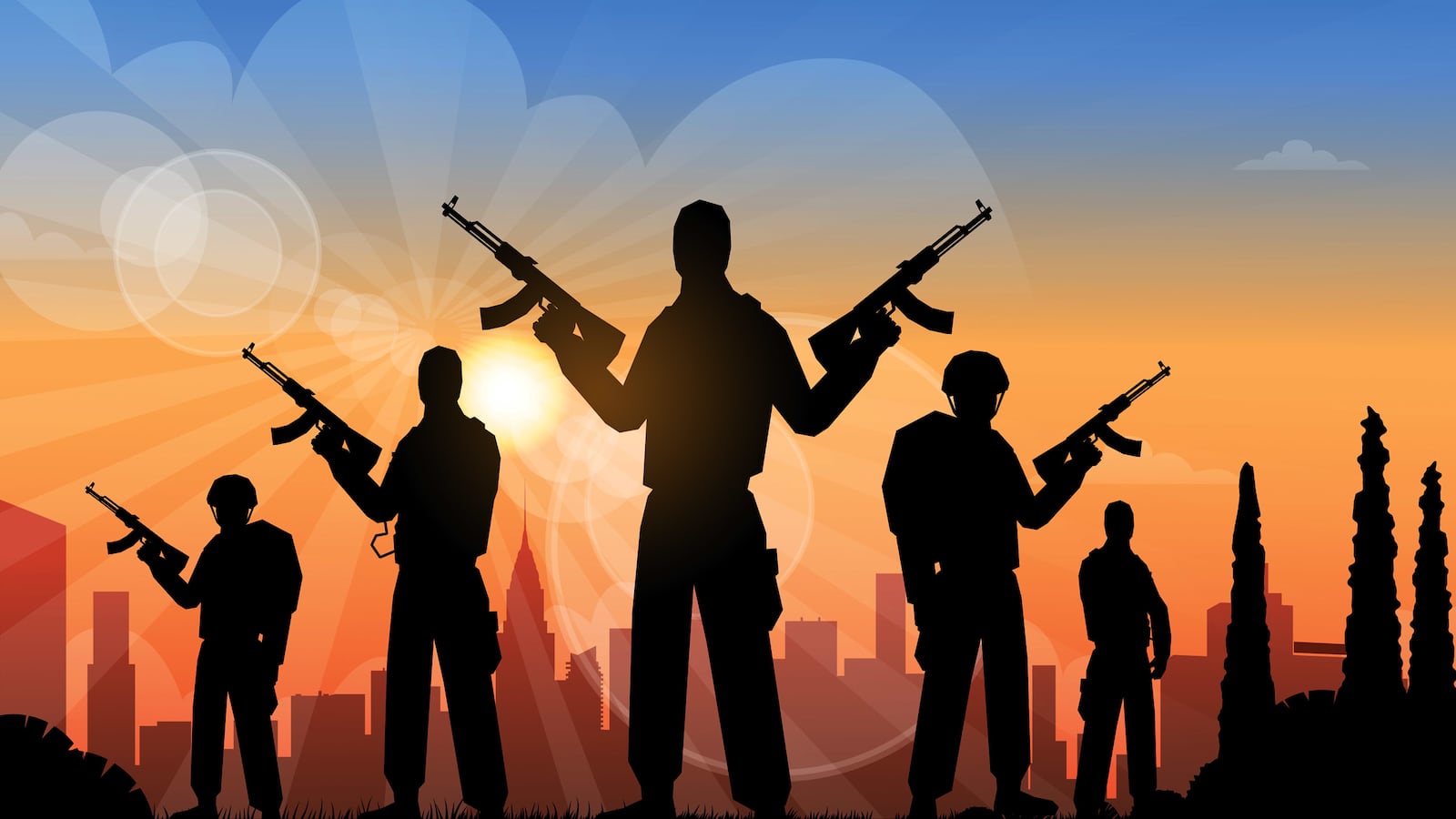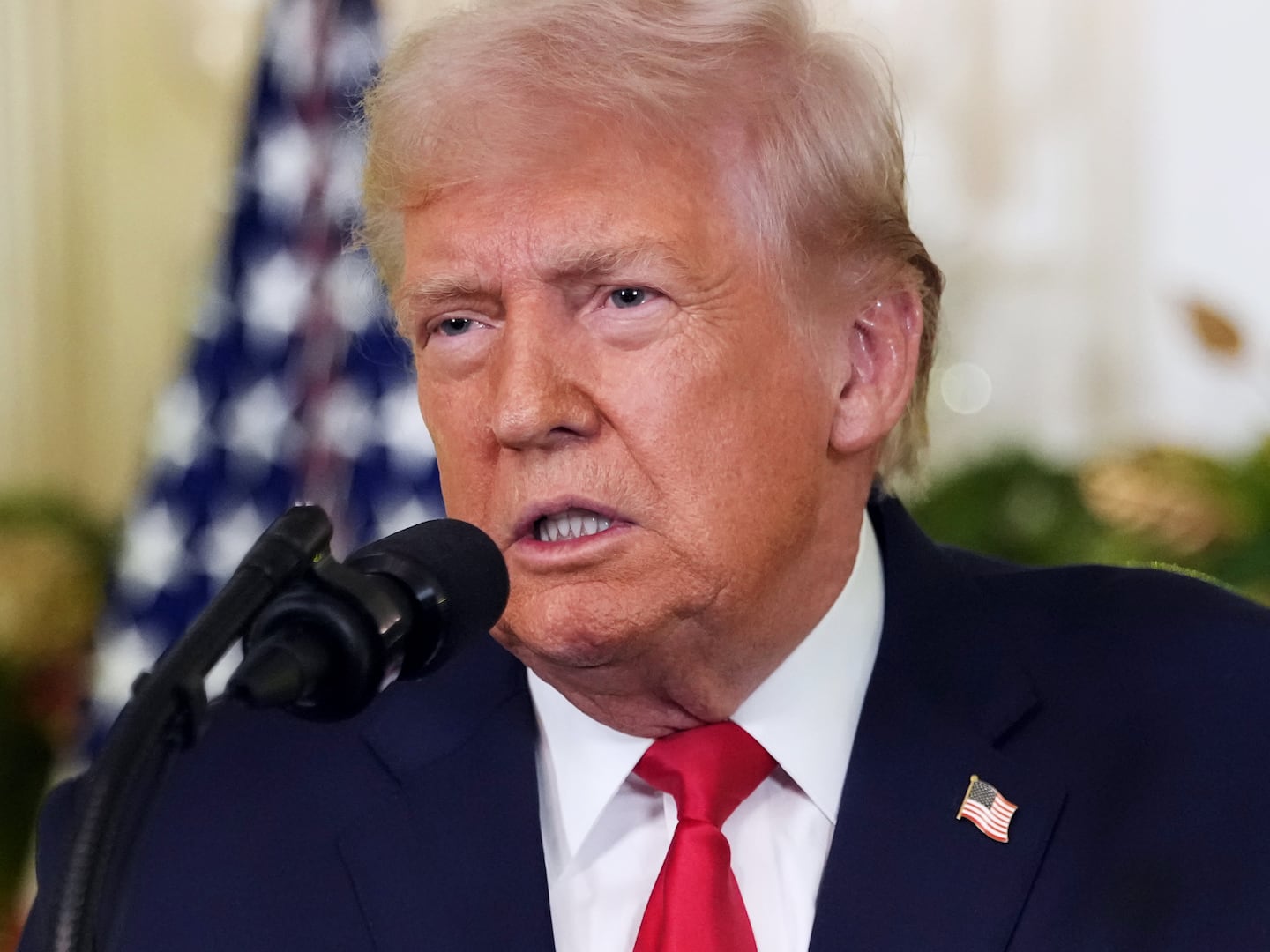ORLANDO, Florida — Some kids (and adults) took off their Mickey Mouse ears in Orlando Airport on Friday, but Muslim women who wore hijabs covering their hair kept them on. Security is a complicated thing, and requires a certain level of perspective.
We ditched our water bottles, emptied our pockets—money, wallets, keys, even Kleenex. We took off our shoes. We filled trays for the X-ray machine, then we raised our hands for the full-body scans as mysterious rays penetrated our clothes to reveal whatever might be concealed next to the flesh (or in the hair beneath the hijab).
The line was long and slow, but nobody objected. Nobody really thought twice about what has become the dreary ordeal of travel. This is the price we pay for the past successes of terrorists, we’re told.
But, in truth, it’s not.
In many cases we are paying for the past failures of terrorists—the near misses, the almost made its. The great and tragic irony of the last 15 years is that our way of living to some extent and our way of traveling to a great extent has been changed radically by woulda-coulda-shoulda jihadists, many of them idiots, almost all of them capital-L Losers before they embraced the métier of mass slaughter, and most of them abject failures after they did.
We take off our shoes because Richard Reid (who used the pseudonym Van Damme, fantasizing about his favorite action hero) wore explosive sneakers onto an American Airlines plane bound from Paris to Miami on December 22, 2001, three months after 9/11. A flight attendant spotted him fumbling with matches that wouldn’t light the fuse attached to his sole.
We toss out our water bottles because 10 years ago British authorities thwarted a plot by several inept jihadists who would have used explosives disguised as sports drinks to blow up multiple airliners simultaneously in what British police called “mass murder on an unimaginable scale.” It took two trials to convince a British jury that three of the eight men charged in the case actually conspired to set off bombs in airplanes, and none ever came close to doing so.
We go through those ever-controversial full-body scanners (average cost, $150,000 apiece) because a privileged Nigerian kid was recruited by al Qaeda’s affiliate in Yemen to wear explosive underwear on a Northwest Airlines flight to Detroit on Christmas Day 2009. All he managed to do was fry his balls—and set off a political firestorm.
This is not to argue that precautions are not necessary. They absolutely are. But most of those we see are last-ditch efforts to defend against failed or theoretical plots, while the real challenge is to detect, disrupt and eliminate truly monstrous conspiracies before they happen.
The good news: that’s something that Western intelligence services, with a few lapses, have done very well indeed. When President Barack Obama says there will be no more 9/11s, he almost certainly is right, although what’s left of the core al Qaeda leadership still longs for an atrocity worthy of disaster-film director Roland Emmerich.
The bad news: in the Age of Anxiety, as my colleague Michael Weiss calls it, the jihadists have learned they get almost as much social, political and economic impact out of minor events, and even failure, as they do out of “successful” atrocities.
And that’s not so much because of the bad guys as it is because of us.
The terror perpetrated by the few has become a tool used by demagogues—our demagogues—to frighten and sometimes to stampede the masses. (Am I thinking of Donald Trump? Marine Le Pen? Geert Wilders? Boris Johnson in Brexit mode? Yes.)
What we have lost in the 15 years since the horrors of September 11, 2001, is a sense of perspective about the scale of the threat we face.
Yes, we are looking at an asymmetrical “war,” but never has the asymmetry been so enormous. There are, in absolute terms, a very, very small number of bad guys determined to attack Western targets, and a still smaller number capable of carrying out even the most rudimentary operations.
If we look back at the horrific events of the last two years in Europe—Charlie Hebdo, November 13, the Brussels Airport and Metro, the Nice promenade (and throw in San Bernardino, California)—we are talking not about thousands of terrorist operatives, and not even hundreds. We’re talking about dozens, several loners, and in Europe a few very small and sometimes interrelated groups.
If we add to those all the suspects who have gone to ISIS-land and have come back or might come back to Europe and the United States, the number climbs to a few thousand. That is to say, about the size of a big public high school in the United States. But it’s doubtful that all, or even most of them will try to carry out terrorist attacks. A core truth of human nature is that most people just want to get on with their lives, including some who once fancied themselves as holy warriors.
Let us, for a moment, look back at the events of 9/11 and the way perspective was lost.
The sheer scale of the horror was hard to fathom, and still is. On that bright, sunny Tuesday morning in September 2001, two airliners flown by suicidal terrorists blew up the World Trade Center and another crashed into the Pentagon. America was under attack. More than 3,000 people died, but in the first days there were fears the number could be 10,000 or more.
Truly, this was war—the same “war” that Osama bin Laden had been declaring and preaching, and some of his acolytes had been waging, and most of the world had been ignoring for almost a decade. But even those of us who had been covering Bin Laden’s jihad and trying to warn about it for years did not anticipate such a spectacular and devastating attack.
I happened to be in New York City that morning, and as I rushed on foot from the Upper East Side to my office on Columbus Circle, I could see as I looked down Fifth Avenue the enormous thunderhead of smoke and ash rising where the Twin Towers had stood.
Later in the day, the survivors would be walking up the avenue to their homes, living ghosts covered in the gray-white dust of the collapsed skyscrapers. But just at that moment, the streets of the city were almost empty.
Then, while crossing Central Park, I saw there were still runners. One woman in Lycra wearing radio headphones glanced at me as she jogged by. “How about those terrorists?” she said without stopping. She might just as well have been saying, “How about those Yankees?” She would, as the British like to say, keep calm and carry on.
In the hours and days that followed, the sheer resilience and enormous bravery of the people in the city was everywhere visible, from Ground Zero to the blood banks, in office buildings and in outdoor cafes. Life went on. And amazingly, reassuringly it went on pretty much as normal.
But that wasn’t enough for the nation’s leaders. The George W. Bush administration wanted to wage a war to end all terrorist wars. The obvious first target: Afghanistan. But in a matter of weeks the Taliban fell, and the war waged to do that was a minimalist work of art. Not very satisfying from a political point of view.
Then came the invasion of Iraq, based on a theoretical and, as it turned out, erroneous assumption that the tyrant Saddam Hussein had weapons of mass destruction—even nukes! And that he might share this hard-won national resource with rather random terrorists, maybe even Bin Laden.
But, as it turned out—many thousands of lives and trillions of dollars later—no, that wasn’t the case.
We had not gone to war because of what we knew, but because of what we did not know—because of "the unknown unkowns," in Defense Secretary Donald Rumsfeld's memorable phrase. In November 2001, Vice President Dick Cheney announced that if there was "a one percent chance" that a threat might be real “we have to treat it as a certainty in terms of our response.” He added, “It’s not about our analysis, or finding a preponderance of evidence.” The quest for perfect security became the enemy of common sense. Our leaders, including Sen. Hillary Clinton, convinced themselves they could not be sure Saddam had no WMD unless we invaded and occupied the country he ruled.
By the end of 2003, when that occupation already showed signs it was a major disaster and no WMD had been found, the fear of nuclear terrorists still would not die. As The Daily Beast's Shane Harris reported this weekend, officials in Washington were so worried that al Qaeda somehow had acquired nukes that then-NSA Director Michael Hayden told his British counterpart at GCHQ to be ready in case the NSA was obliterated and the Brits had to pick up the pieces. But, no, al Qaeda did not have nukes either.
American officials intimately familiar with the region had warned that the invasion of Iraq was a disaster in the making, and so did key American allies like then-Egyptian President Hosni Mubarak, who declared that toppling Saddam would create 100 new Bin Ladens.
There’s no point repeating that whole sad, stupid history, except to say that Mubarak, whatever his flaws, was smarter than the Bush administration on this rather important issue.
The Obama administration, in its efforts to clean up the mess, drew down the hated (yes hated) armies of occupation in Iraq and Afghanistan, and stepped up the focused attacks on the key cadres driving the jihadi effort, including Osama Bin Laden, terminated in 2011.
But Obama failed to counter the hysteria generated by the very small attacks in the United States, and the atrocities committed in Europe. He treated the public impact as an intellectual exercise when what was needed was emotional reassurance. Obama also failed to see that the mess left behind by the foolish invasion and senseless occupation of Iraq had opened the way for a new regional war. The aggressors combined the extremism of al Qaeda with the military acumen of Saddam's disbanded military. Obama called them the junior varsity. After they took the second largest city in Iraq, they called themselves the Islamic State.
So the war begun on the ground in the Levant by the Bush administration goes on, and on. And the terror it was supposed to stop has morphed into something much less spectacular than 9/11, but much more ubiquitous. Terrorists have learned they do not need to replicate Armageddon to cripple the West. They need only rely on the Pavlovian reaction of the press and politicians to turn sordid petty crimes into atrocities, the actions of a few fanatics into a clash of civilizations.
The bad guys today do not need to spend half a million dollars organizing an attack like the one a decade and a half ago, they only need to buy a few guns and take a few shots, or they simply rent a truck and turn it into a killing machine. "It's so easy!" an Islamist thug in France told the world in June as he live-streamed his murder of a man and wife, both French police officers stabbed to death in front of their 3-year-old son.
So on this, the 15th anniversary of the September 2001 atrocity, we live in fear.
The most infamous bad guys may not be alive to savor the moment, but they are winning. And our leaders, and would-be leaders, have been their accomplices.






